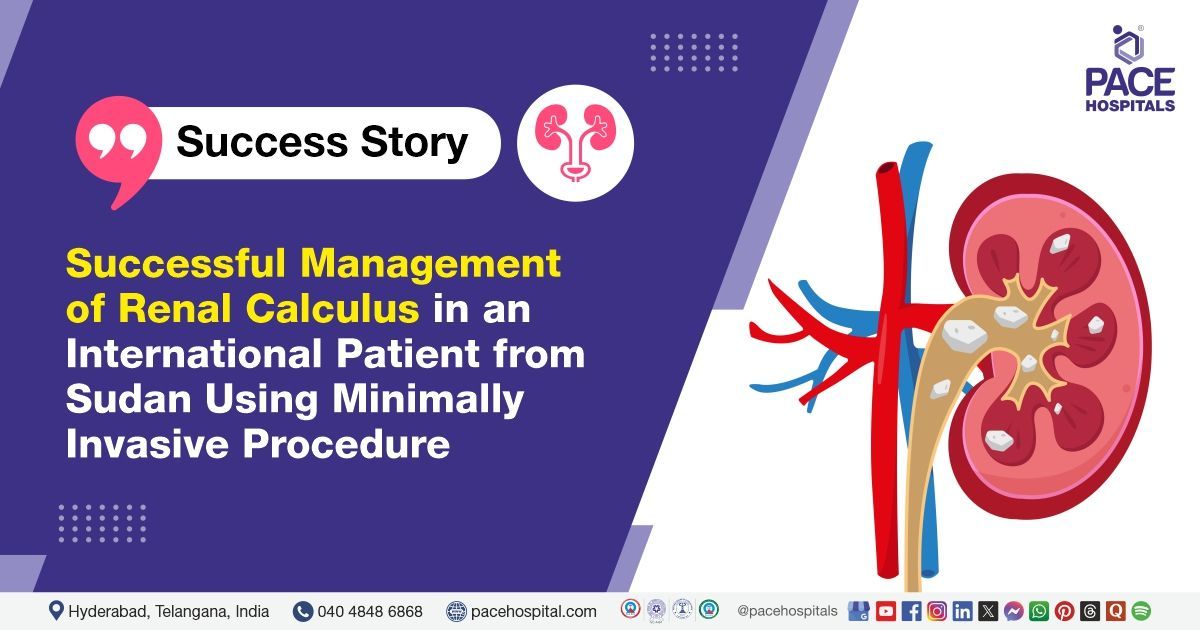Successful Management of Right Kidney Stone in an International Patient from Sudan using a Minimally Invasive Procedure
PACE Hospitals
A 40-year-old male from Sudan presented with right flank pain and was diagnosed with a right renal calculus at the pelviureteric junction (PUJ), causing moderate hydronephrosis. He underwent
PCNL, URSL, and DJ stenting, achieving complete stone clearance and ensuring relief from symptoms and improved quality of life.
Chief complaints
A 40-year-old male from Sudan presented to
PACE Hospitals, Hyderabad, with complaints of right flank pain. The pain was the primary symptom that led to further evaluation and diagnosis.
Medical history and Diagnosis
The patient was diagnosed with a
right renal calculus (Kidney stones) located at the pelviureteric junction (PUJ), which was causing moderate
hydronephrosis. This condition was confirmed through diagnostic imaging, which revealed the obstruction and associated dilation of the renal pelvis.
Treatment Plan and Surgical Procedure
Upon confirmation of the diagnosis, Consultant Laparoscopic Urologist, Endourologist, Andrologist & Kidney Transplant Surgeon Dr. Abhik Debnath along with Dr. K Ravichandra recommended a minimally invasive approach to manage the condition, involving right percutaneous nephrolithotomy (PCNL), ureteroscopic lithotripsy (URSL), and the placement of a double-J (DJ) stent.
During the surgery, a midpole posterior calyceal puncture was made on the right kidney, and the tract was dilated to 21 French (Fr). Using an 18 Fr nephroscope, the stone was fragmented and completely cleared.
Intraoperatively, mild mucosal edema was noted at the site of stone impaction. General anesthesia was used for the procedure, and the patient tolerated it well without any complications.
Postoperative Course
The patient's intraoperative and postoperative recovery was successful. He experienced no significant complications and was stable at the time of discharge.
Expected postoperative symptoms, such as mild flank or suprapubic discomfort, occasional blood or cloudiness in urine, and mild burning sensation during urination, were explained to the patient, along with reassurance that these symptoms would typically resolve within 7–10 days.
Diet Notes
Postoperative dietary advice was aimed at preventing the recurrence of renal calculi and promoting overall recovery.
The patient was instructed to maintain adequate hydration by drinking plenty of fluids. He was encouraged to include citrus fruits such as lemon and orange juices in his diet to alkalinize the urine and reduce stone formation.
A low-purine and low-salt diet was recommended to minimize uric acid production and calcium excretion in the urine, which are common contributors to stone formation.
Discharge Medications
The discharge medications included antibiotics to prevent infections, antipyretics to manage fever, proton pump inhibitors (PPIs) to prevent gastric irritation, alpha blockers to relax smooth muscles and aid urinary flow, and a urine alkalizer to maintain optimal urinary pH. These medications were aimed at facilitating recovery and preventing complications.
Discharge Instructions
The patient was advised to avoid lifting heavy weights, forward bending, and prolonged travel on buses, autos, or two-wheelers. Straining during bowel movements was also discouraged to minimize pressure on the surgical site.
He was informed that passage of stone fragments in the urine was normal, and mild symptoms like occasional blood in the urine, cloudy urine, or discomfort were expected as part of the healing process. However, he was instructed to report immediately to the emergency department in case of fever, severe abdominal pain, or vomiting, as these could indicate complications.
Review Notes
The patient was advised to return for a follow-up visit after two months for DJ stent removal. This is a crucial step in the post-treatment plan to prevent stent-related complications, such as infections or encrustation.
Impact of PCNL with URSL and DJ stenting in complete elimination of renal calculi
This case demonstrates the successful management of a symptomatic right renal calculus with moderate hydronephrosis using minimally invasive techniques. The combination of PCNL, URSL, and DJ stenting provided complete stone clearance with minimal complications, ensuring symptom relief and improved quality of life for the patient. Postoperative care, including dietary modifications and activity restrictions, was emphasized to support recovery and prevent recurrence. The case highlights the importance of timely diagnosis, a well-executed surgical approach, and comprehensive patient education in achieving optimal outcomes in the management of complex urological conditions.
Share on
Request an appointment
Fill in the appointment form or call us instantly to book a confirmed appointment with our super specialist at 04048486868
Appointment request - health articles
Recent Articles











